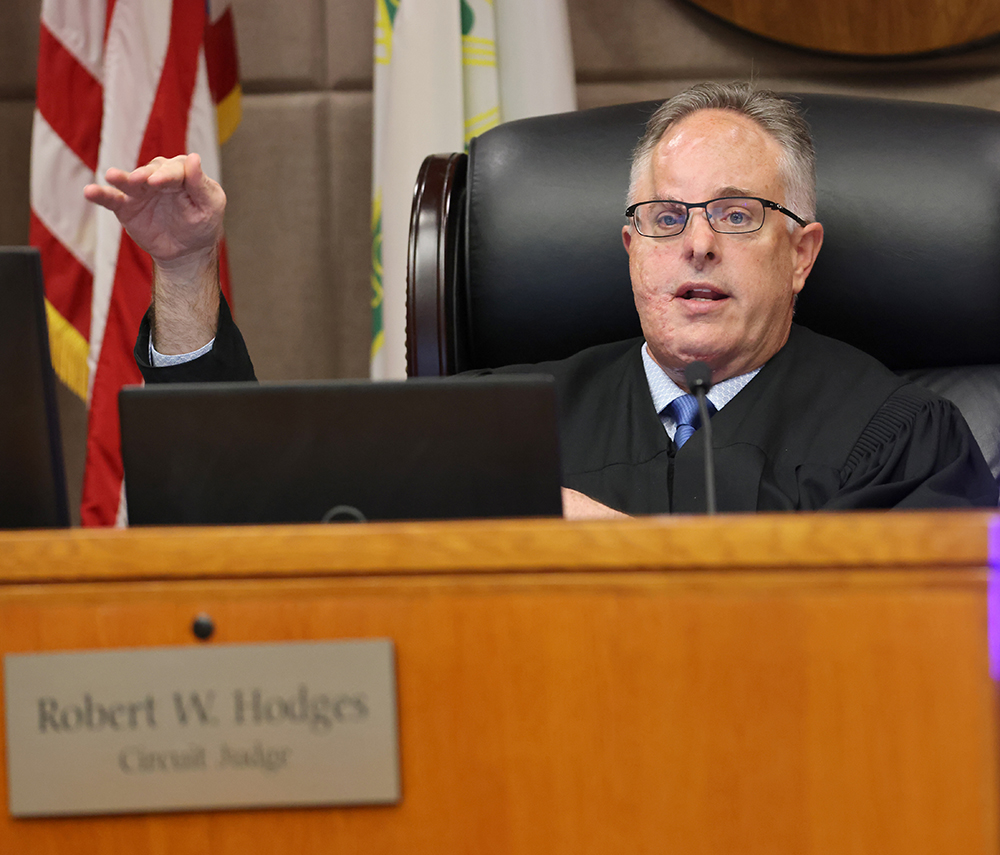Judge orders Ocala to send out notices to all who paid illegal fire fee tax about final hearing and their refunds

Circuit Court Judge Robert Hodges speaks with attorneys during pre-trial conferences at the Marion County Judicial Center in Ocala, Fla. on Wednesday, Jan. 5, 2022. [Bruce Ackerman/Ocala Gazette]
A judge last week provided some clarity to the burning question of how Ocala residents and businesses, past and present, will be able to get back almost $80 million in fire fees they were made to pay years ago under a tax that was later found to be illegal.
In a hearing on Friday, Marion County Circuit Judge Robert W. Hodges dismissed the City of Ocala’s proposal that those seeking their share of the court-ordered refunds be made to apply to the city for their money.
The case stems from a long-running class-action suit that was filed in 2014 over the approximately $15 a month that more than one hundred thousand Ocala residents paid for fire services as an add on to their Ocala utility bills from 2010 until 2021. During the trial, the city’s attorney, Patrick Gilligan, explained Ocala implemented the tax in 2007 to spread the cost of fire services across a broad group of citizens who wouldn’t be paying because they didn’t own real property or were tax-exempt. An appellate court found the fees constituted an illegal tax, and in October, Hodges ordered the city to establish a common fund to refund the fees.
On Friday, Hodges ordered the city to send out a notice to all customers who paid the fees. The notice sets the case for a final hearing on May 10 at 1:30 p.m. and proposes how the $80 million should be paid out.
The bulk of the fund, $72,633,228, would be used to make refunds to those who paid the fire fees. The law firm that handled the litigation over the past eight years, Bowen & Schroth, would receive $6,649,681 in attorneys’ fees and reimbursement of costs. Dale Birch and Discount Sleep of Ocala, LLC, who initiated the class-action suit, would be awarded $50,000 each.
Although city officials have not said publicly where they intend to find the millions needed for the refunds, public records and pleadings reveal Ocala has identified $20 million in unrestricted funds and seeks to obtain $60 million in loans that it would draw down only as needed.
The unresolved key questions are: How should Ocala handle those customers who paid the fees and thus are owed a refund but who have moved away and may be hard to locate? This group are more transient residents, particularly renters.
Communications between the banks and the city reflect the city’s hope that the judge would approve their suggested application process and that a substantial portion of those owed refunds would not participate, thus forfeiting what they were owed—and giving the city a break on paying back the entire $80 million.
Jason Zimmerman, who represented the City of Ocala at Friday’s hearing, argued for the application process.
“If someone paid in 2013 at a certain address and they then moved, we’re going to send it to the address that they’re no longer at?” he asked Hodges. “That’s the concern that we have: businesses that have come and gone but who have paid this.”
Hodges rejected that argument, reasoning that if Ocala is still billing those same customers for electricity and water services, the city knows who they are and thus knows where to send the refund check. The customers should not have to apply to receive their money.
Derek Schroth, attorney for the class, told the judge that his office had used a service called Direct One to verify addresses and the city could also hire that same type of service. Zimmerman indicated that the city would hire a third party to do notifications to more than 100,000 prior customers.
In a follow-up interview after the hearing, Schroth, indicated that the court would need to establish a final date where uncashed checks expire and the case is closed and that would likely require refining the exact details of disbursement after the first round of checks went out to those parties who are identified as current customers by the city.
Although not discussed during the hearing or in the pleadings, Fla. Stat. Chapter 717, Florida Disposition of Unclaimed Property Act, sets forth rules for disposing of unclaimed property that might become applicable in this instance if the city cannot locate an old customer.
“Due diligence” is defined under the statute as “reasonable and prudent methods under particular circumstances to locate apparent owners of inactive accounts using the taxpayer identification number or social security number, if known, which may include, but are not limited to, using a nationwide database, cross-indexing with other records of the holder, mailing to the last known address unless the last known address is known to be inaccurate, or engaging a licensed agency or company capable of conducting such search and providing updated addresses.”
Under the act, funds can be submitted to the state and advertised on the state’s website https://www.fltreasurehunt.gov in an effort to have them claimed.





